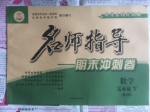题目内容
The fact is that everyone has to grow up and mature, ________ come some growing pains.
A. with which B. when C. that D. which
A
【解析】
试题分析:考查非限定性定语从句。主句与从句用逗号隔开,说明这是一个非限定性定语从句,因此用which引导,同时从句中缺少一个伴随介词with,表示在成长过程中伴随着一些痛苦。句意:事实上每个人都不得不成长并成熟起来,在这个过程中,会伴随着一些成长的痛苦。故选A。
考点:考查非限定性定语从句

练习册系列答案
 名师指导期末冲刺卷系列答案
名师指导期末冲刺卷系列答案
相关题目